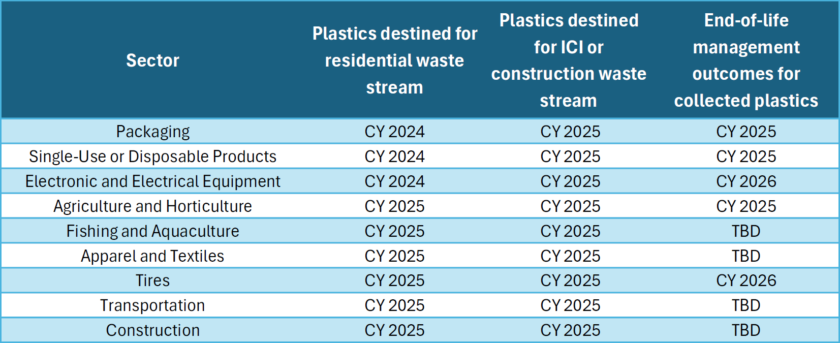Canada Mandates Reporting on Plastic Products, Packaging

Newsletter Articles
Consumer product manufacturers, importers, and retailers in Canada face new reporting obligations under the Federal Plastics Registry (“Plastics Registry”), a data collection exercise to inform current and future regulation of plastics in the Canadian market.[1] With reporting obligations beginning as early as September 2025, covered entities will have to take steps now to ensure that they fulfill their reporting obligations.
The Plastics Registry builds on existing reporting requirements for companies under provincial and territorial extended producer responsibility (“EPR”) programs. It requires producers of plastic products, among other regulated companies, to report information including the quantity and type of plastic introduced by their products into the Canadian market. The list of covered products is extensive, and includes plastic packaging, disposable products, apparel and textiles, and construction.
The Plastics Registry is the latest step taken by Canada as part of a Zero Plastic Waste Agenda to manage and limit the quantity of plastics in the market, particularly single-use plastics, distributed nationwide. Down the road, the information compiled will inform stewardship and end-of-life management regulations.
What is the purpose and scope of the Plastics Registry?
The Plastics Registry intends to strengthen the application of provincial and territorial EPR programs and inform future regulatory activities. The Plastics Registry’s reporting obligations both build on existing reporting requirements and extend compliance obligations to unregulated segments of the plastics industry. For example, the initial reporting obligations for calendar year 2024 apply to packaging, single-use or disposable plastics, and electronic and electrical equipment, because many Canadian jurisdictions already subject these product categories to EPR reporting obligations.
Several categories of companies are assigned reporting obligations under the Plastics Registry:
- Companies that manufacture, import, and place specified plastic resins on the market in Canada;
- Companies that manufacture, import, and place specified plastic products on the market in Canada;
- Companies that generate packaging and plastic product waste at their industrial, commercial or institutional (“ICI”) facility; and
- Companies that are service providers for the management of specified plastics or plastic products, and conduct defined “end-of-life” activities such as refurbishing, recycling, composting, or landfilling the plastic goods.
This article focuses on the obligations of companies in the second category – companies that introduce plastic products into the market in Canada – but companies that manage plastic resins, generate plastic waste at their ICI facilities, or provide “end-of-life” management for plastic goods may also contact Marten Law with questions regarding their compliance obligations.
What companies are “producers” subject to the reporting?
The producers of plastic products that must comply with the reporting obligations are defined according to the following hierarchy:
- Brand owners or intellectual property holders who reside in Canada;
- If there is no such party, the producer is the first resident person in Canada to import or manufacture the product;
- If no such party under (A) or (B) exists, the producer is the Canadian retailer who supplied the product to the consumer.
Special circumstances exist for online transactions when a retailer would be the producer under the hierarchy above, but that retailer is a marketplace seller whose goods are sold by a marketplace facilitator. A marketplace facilitator operates an online consumer-facing marketplace where the marketplace seller’s products are listed for sale, and physically distributes the marketplace seller’s products to the consumer, through storage, preparation, or shipping.[2] If the retailer/marketplace seller contracts with a “marketplace facilitator” to sell their goods, then the marketplace facilitator will be the producer with the reporting obligation.
What do producers need to report?
Producers need to report the total quantity of plastic packaging and products by resin, resin source, category, and subcategory that are manufactured, imported, or placed on the market in Canada, and:
- Destined for the residential waste stream;
- Destined for the industrial, commercial and institutional (“ICI”) waste stream;
- Destined for the construction, demolition, and renovation waste stream; or,
- Collected for end-of-life product management.
For the final reporting requirement, producers are asked to provide granular information regarding end-of-life outcomes for plastic placed on the market, such as whether the plastic is diverted for chemical recycling, incineration, composting, or other activities.[3] In practice, for most producers, this information will be provided by Producer Responsibility Organizations (“PROs”), as explained further below.
What is the due diligence standard?
These reporting obligations are issued as a Notice under section 46 of the Canadian Environmental Protection Act, 1999 (“CEPA”), which authorizes Environmental and Climate Change Canada (“ECCC”) to request information to which a company “may reasonably be expected to have access.”[4] Obligated reporters are expected to contact their suppliers for requested information that the reporting company does not possess.
What are Producer Responsibility Organizations (“PROs”), and can they help producers meet their reporting obligations?
PROs help producers meet the requirements imposed by the provincial and territorial EPR programs. Canadian EPR programs require producers to not only fund end-of-life product management; they require those producers to administer the end-of-life management programs. These management responsibilities, such as collecting, processing, and tracking materials, are typically handled by PROs, whose activities are funded by their member producers.
The Plastics Registry is designed to build on the framework created by existing EPR programs and specifically permits producers to authorize third parties to comply with reporting obligations on their behalf. Accordingly, PROs can report under the Plastics Registry on behalf of member producers, and the first categories of plastic products required to report – packaging, single-use and disposable products, and electronics – are already covered by EPR programs in many jurisdictions.[5]
What exemptions for producer reporting obligations exist?
Producers that manufacture, import, or place onto the Canadian market less than 1,000 kg of plastic in specified product or packaging categories per year are exempt from reporting obligations.[6]
Are there confidential business information protections?
ECCC intends to publish information on plastic products received in response to the Notice. However, as with other reporting obligations under CEPA, a company may request the information be treated as confidential if: the information is a trade secret; its disclosure would likely cause material financial loss to or prejudice the competitive position of the submitter; or its disclosure would likely interfere with negotiations being conducted by the submitter.[7]
The ECCC may nonetheless publish the information if: its disclosure is in the interest of protecting the environment, public health, or public safety; and the public interest in the disclosure outweighs any material financial loss or prejudice to the competitive position of the submitter and any damage to the privacy, reputation, or human dignity of such person.[8] ECCC also suggested during earlier consultation phases that provincial and territorial governments might receive all raw data supplied through the Plastics Registry to assist with EPR program compliance and enforcement, but the final notice does not state whether such sharing will occur.
What are the reporting timelines?
The first reporting deadline is September 29, 2025, at which point producers of plastic packaging, electronic and electrical equipment, and single-use or disposable products must report information regarding plastics placed on the market in calendar year 2024 that are destined for the residential waste stream. For companies seeking extensions to reporting deadlines, CEPA authorizes persons subject to Section 46 notices to request extensions by writing to ECCC.
The table below outlines the calendar year for which producers of specified plastic good categories must begin providing the requested information. The reporting deadline for the requested information from each calendar year is September 29 of the following year. Producers must then continue fulfilling any reporting obligations through at least calendar year 2026; Canada has not yet released clear directions regarding what reporting obligations will remain in subsequent years.
Newsletter Articles
Authors
Related Services and Industries

The ECCC Notice authorizing the Plastics Registry includes subcategories for each of the categories listed above to clarify the scope of products on which companies must report. For example, the apparel and textiles category includes products in the following subcategories: apparel; interior textiles; industrial textiles; carpet and other floor coverings; footwear; yarn, thread, twine, cordage, ropes, cables, woven and knitted or crocheted fabric; luggage; and reusable fabric checkout bags.[9] Companies should review the subcategories to determine which of their products are subject to the reporting requirements.
What are the penalties for non-compliance?
Companies that fail to respond to the Notice despite being subject to it, or that provide information that is negligently false or misleading, could face substantial financial penalties. Under CEPA, penalties for entities that violate the requirements of a Section 46 notice range from up to $25,000 CAD for a small company after summary proceedings to up to $1 million CAD for repeat offenses by a large corporation. Penalty severity also depends on whether the offence was committed knowingly or negligently.[10]
Conclusion
The Plastics Registry is one component of a federal, provincial, and territorial push to manage plastics and to reduce their use.[11] Covered entities globally will need to keep up with evolving compliance obligations and prepare to comply with the Plastics Registry reporting obligations beginning in Fall 2025.
For help complying with U.S. and Canadian product requirements, please contact members of Marten’s Consumer Products Practice, including Isabel Carey, James Pollack and Zack Zahner.
[1] Dep’t of the Environment, Notice of intent to issue a notice under section 46 of the Act with respect to reporting of certain plastic products for 2024, 2025, and 2026, 158 Can. Gazette (Apr. 20, 2024), https://gazette.gc.ca/rp-pr/p1/2024/2024-04-20/html/notice-avis-eng.html [“ECCC Notice”].
[2] ECCC Notice at Sch 2.
[3] ECCC Notice at Sch 4, s 11. Specifically, companies must report on the quantities of plastics collected or diverted for: direct reuse; refurbishment; repair; remanufacturing; mechanical recycling; chemical recycling; processing into chemicals, including fuels; composting; incineration with energy recovery; incineration for industrial processes; or sent for final disposal through incineration without energy recovery or to landfill.
[4] Canadian Environmental Protection Act, 1999, SC 1999, c 33, s 46 [CEPA].
[5] ECCC Notice at Sch 4, s 3; Government of Canada, Technical Paper: Federal Plastics Registry (date modified Apr. 18, 2023), at s 2.3, https://www.canada.ca/en/environment-climate-change/services/canadian-environmental-protection-act-registry/technical-paper-federal-plastics-registry.html.
[6] ECCC Notice at Sch 3, s 5.
[7] CEPA at s 51-52.
[8] CEPA at s 53.
[9] ECCC Notice at Parts 3-4.
[10] CEPA at ss 272, 272.1.
[11] See Isabel Q. Carey, Packaging Waste Disposal Becoming Responsibility of Manufacturers, Retailers, Marten Law (Apr. 1, 2025), https://martenlaw.com/news/packaging-waste-disposal-becoming-responsibility-of-manufacturers-retailers.
Authors
Related Services and Industries
Stay Informed
Sign up for our law and policy newsletter to receive email alerts and in-depth articles on recent developments and cutting-edge debates within our core practice areas.
